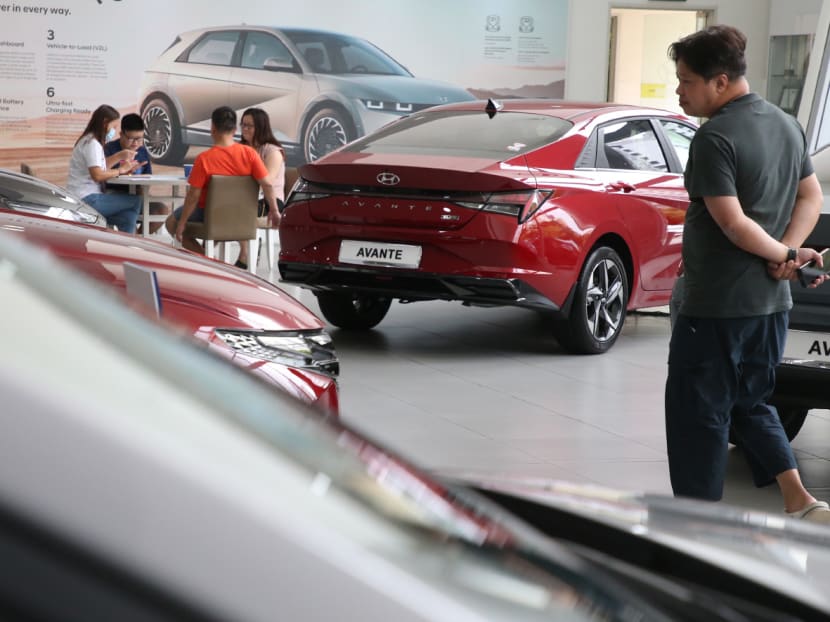Record COE prices are making their dream harder to fulfil, say aspiring car owners
SINGAPORE — Every time Ms Mandy Mok leaves her home with her three-year-old daughter, she has to bring along a stroller and a heavy diaper bag laden with everything the child may need for a day out. That is why the 39-year-old yearns to have her own car.

COE prices have posted regular fresh highs over recent months as demand to put more cars on the road outstrips COE supply.
- COE prices broke new records in the bidding exercise that ended on Wednesday last week (April 5)
- They have posted regular fresh highs in various categories since early November 2022
- TODAY spoke with seven individuals from all walks of life to find out how the high COEs have impacted their decision to own a car
- The continuing strong demand for COEs comes as the Government presses ahead with its plan to reduce the country's reliance on cars
SINGAPORE — Every time Ms Mandy Mok leaves her home with her three-year-old daughter, she has to take along a stroller and a heavy diaper bag laden with everything the child may need for a day out. That is why the 39-year-old yearns to have her own car.
"We have been using Grab or cabs but for planned family outings, we opted for car rental or car sharing services such as TribeCar," she told TODAY.
"We wanted to get a car so that we can easily travel with a child but have continuously put it off due to the high costs."
“We wanted to get a car so that we can easily travel with a child but have continuously put it off due to the high costs.Aspiring car owner Mandy Mok”
She is one of seven aspiring car owners interviewed by TODAY who said they would love to own a car for reasons such as work, convenience or even to gain more prestige among their peers and colleagues.
Some of them have owned cars before while others are managing for now by using ride sharing services and rental cars.
However, all seven said that the prohibitive costs of buying a car in Singapore these days are getting in the way of their aspiration, including high Certificate of Entitlement (COE) prices.
For example, in the latest bidding exercise last Wednesday (April 5), COE prices for small and large cars as well as those for vehicles in the open category hit new record highs.
Small cars (up to 1,600cc & 97kW) or fully electric cars with output of up to 110kW rose to S$96,501 from S$93,503 while large cars (above 1,600cc or 97kW) or fully electric cars with output over 110kW had increased from S$116,201 to S$118,501.
In the open category, which can be used for any types of vehicle except motorcycles, premiums rose to S$118,990 from S$116,020. The previous record was S$118,001 in the Feb 22 bidding exercise.
The trend has been fairly consistent over recent months as COE prices have regularly posted fresh highs.
The high prices come as a result of high demand for COEs alongside a government policy to keep supply steady by maintaining zero annual growth of COEs.
This is part of the push for Singapore to evolve into a "car-lite" society with less reliance on car ownership given the finite supply of land for roads, car parks and other infrastructure associated with cars.
WHY SINGAPOREANS STILL WANT CARS
Real estate agent Andy Tan, aged in his 40s, said that he needs a car for the job but has temporarily held back on making the purchase due to rising COE premiums.
Mr Tan believes that the frequent rises in COE prices is not sustainable and it is becoming more of a "wealth tax" because cars are generally deemed as a luxury only for those who can afford to buy them.
"For people like me who need to drive to get around to appointments for work, it feels like we're being priced out as the cost gets driven higher."
Others, like Ms Mok, feel having a car would improve their family's lives, especially when kids are in the picture.
Sales engineer Ivan Yulian Suryawinata, 31, said that he wants to buy a car to use when he and his wife start a family.
"A car for me would mean the ability to move around better, especially when we need to run errands, which I foresee will happen a lot when my wife and I have a child," he said.
Since her family's decision to scrap their car in 2022 because they couldn't afford to renew the COE, senior graphic designer Sara Ng, 29, has had to adjust her lifestyle to accommodate for the loss.
"We usually eat out but now our choices are more limited. We've also avoided going multiple places and carrying heavy things because it becomes a chore without a car. Instead, we just stay home more nowadays."
And there are those who see a car as a status symbol.
As a health consultant, Mr Nick Zhuang, 26, does not need a car for work but he believes owning a vehicle is associated with earning a high income.
"We all know how much it costs to own a car, or at least those who own a car come from a wealthy family who can sponsor them with a car," he said.
"And in certain careers, having a car does affect your personal image like some of my friends in the financial and real estate industry."
“And in certain careers, having a car does affect your personal image like some of my friends in the financial and real estate industry.Health consultant Nick Zhuang”
CAR-LITE SINGAPORE
Given Singapore's finite amount of land, the Government has moved to encourage people to look at options other than cars to get around, although the demand for cars as reflected in the COE prices remains strong.
In a written reply to a parliamentary question in September 2022 on whether COE prices have stabilised, Transport Minister S Iswaran said that prices have increased based on the lower supply and strong underlying demand.
The Land Transport Authority (LTA) has indicated that the COE supply will not increase for a couple of years.
In a statement in October 2021, the LTA said that it would maintain the existing zero growth rate per annum for cars and motorcycles until January 2025. It had previously been extended until January 2022.
The LTA has moved to mitigate vehicle population growth in view of the country’s land constraints as the number of vehicles on the roads here draws close to one million.
The Sustainable Singapore Blueprint unveiled in 2015 is a 15-year plan aimed at reducing the country's reliance on car ownership by using more more sustainable transport modes such as public buses, the MRT, cycling, walking and car-sharing services.
As Singapore presses ahead to achieve this "car-lite" reality, experts have previously said that Singaporeans' strong aspiration to own cars is a significant hurdle.
They underlined the need to continue improving the public transport system to increase its appeal to commuters and thus decrease the reliance on cars.
EXPLORING ALTERNATIVES
Most of TODAY's interviewees agreed that the local public transport system has been a good alternative as they work towards their goal of owning a car.
Software engineer Christian Suteja, 31, said that these various other modes of transportation make it easy to temporarily shelve the idea of owning a car as he can continue to take public transport to work or book a Grab when he needs one.
Retiree Michael Yeo, 80, scrapped his car a few months ago as COE prices were too high and he was getting old.
He said that the loss of a car meant he would not be travelling around as easily anymore but he saw it as a way to stay close to his children.
"My two daughters, who are both married, stay near me so they will often come to pick me up to go out for food or take me out to get whatever I need, so it’s not too much of a loss for me without a car."








